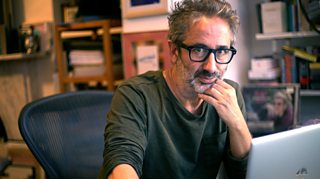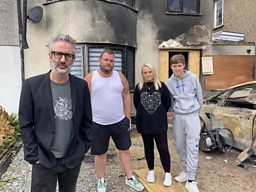David Baddiel: Social Media, Anger and Us
Why is there so much anger on social media?

David Baddiel wants to find out. To get the answers he’s looking for, David locks down his own social media accounts and hits the road.
It’s a tense and challenging journey that sees him meet victims of online abuse and cyber-harassment, endure a traumatic session in an MRI scanner and come face-to-face with the almost-deadly consequences of online hatred.
What made you want to tackle this subject now?
As an early adopter who thinks there’s lots of brilliant things about social media, I’m interested in examining what social media is really doing to us. It’s changing society, the way we talk to each other and it’s changing culture on a deep level. It has a neurological, political and sociological effect.
As well as hearing from victims of online harassment such as builder-turned-TikTok influencer ‘Smithy’ - David examines his own relationship with social media.
I am addicted to this technology and it is changing my brain chemistry. When I came off Twitter and Instagram, I would reflexively take my phone out and find my thumb going towards ‘the bird’ icon. That’s neurological.
The first person David meets on his journey is TikTok influencer ‘Smithy’. They meet just days after Smithy’s car and house were attacked by arsonists.
You see for yourself the real life consequences of online abuse, yet Smithy blames ‘trolls’ not ‘criminals’. Do you think he was downplaying what happened to him?
The thesis of the documentary is that people dismiss social media as not being real life. But what happens on social media isn’t staying on social media. I don’t think he was downplaying it. I think the term ‘trolling’ has evolved from its original purpose. It’s possible that the people who set fire to his car thought it was a laugh. That’s what happens with the normalisation of aggression.
There’s a scene where you have your brain scanned as you read things people have said about you on social media. You joked about the experience causing ‘lasting trauma’. How much truth was hidden in that joke?
It was kind of a joke. I don’t want to compare my social media experiences in a flippant way with other people’s trauma, but the psychologist I spoke to at the end of the film confirmed that the experience of social media abuse has some of the symptoms associated with things like post traumatic stress disorder (PTSD).
I definitely felt traumatised, troubled and exhausted after it. I feel this anxiety all the time because I insist on talking about things, like antisemitism, that attract abuse. I’m worrying now about this documentary going out. I know that some people will want to be furious about it.

What coping mechanisms have you developed for facing social media abuse?
I just let someone else reset my passwords and take a break from social media. The primary coping mechanism if you’re facing abuse is to step away and know that it will pass.
Is there more anger, or are we just seeing it more because of social media?
Social media has increased the availability of anger for people who want to experience it. But it’s also influencing our sense of what’s normal and OK, and that’s making people angrier.
Although not his intention, David believes the documentary comes at a very topical moment.
There seems to be a very big conversation around online abuse at the moment; we’ve got the tragic death of the MP Sir David Amess, the resignation of Jack Dorsey as CEO of Twitter and the Online Safety Bill being discussed in Parliament.
And one of the more controversial proposals being discussed in relation to the Online Safety Bill is the removal of anonymity. But David isn’t convinced by that approach.
Anonymity is a red herring. I’ve seen many abusive, mad, angry things coming from accounts where they are absolutely who they say they are. They’re happy to be that angry. Some of the algorithms being developed to identify abuse before it’s posted might help more than anonymity.
So, what are David’s tips for protecting ourselves online?
The best way to avoid social media abuse is not to go on social media! But if I was talking to someone thinking of using social media for the first time, tip number one would be to tell them to understand how quickly and easily they can be misinterpreted. My second tip would be to accept that no matter how much effort they put into tip number one, people will misinterpret and misrepresent them and some rage will come their way regardless. My third tip would be that if you do ever end up as the target of someone’s anger, to step away, dampen down your own curiosity and don’t look at it.
David Baddiel: Social Media, Anger and Us is available on on iPlayer and 麻豆官网首页入口 Two from 13th December at 21.00.
